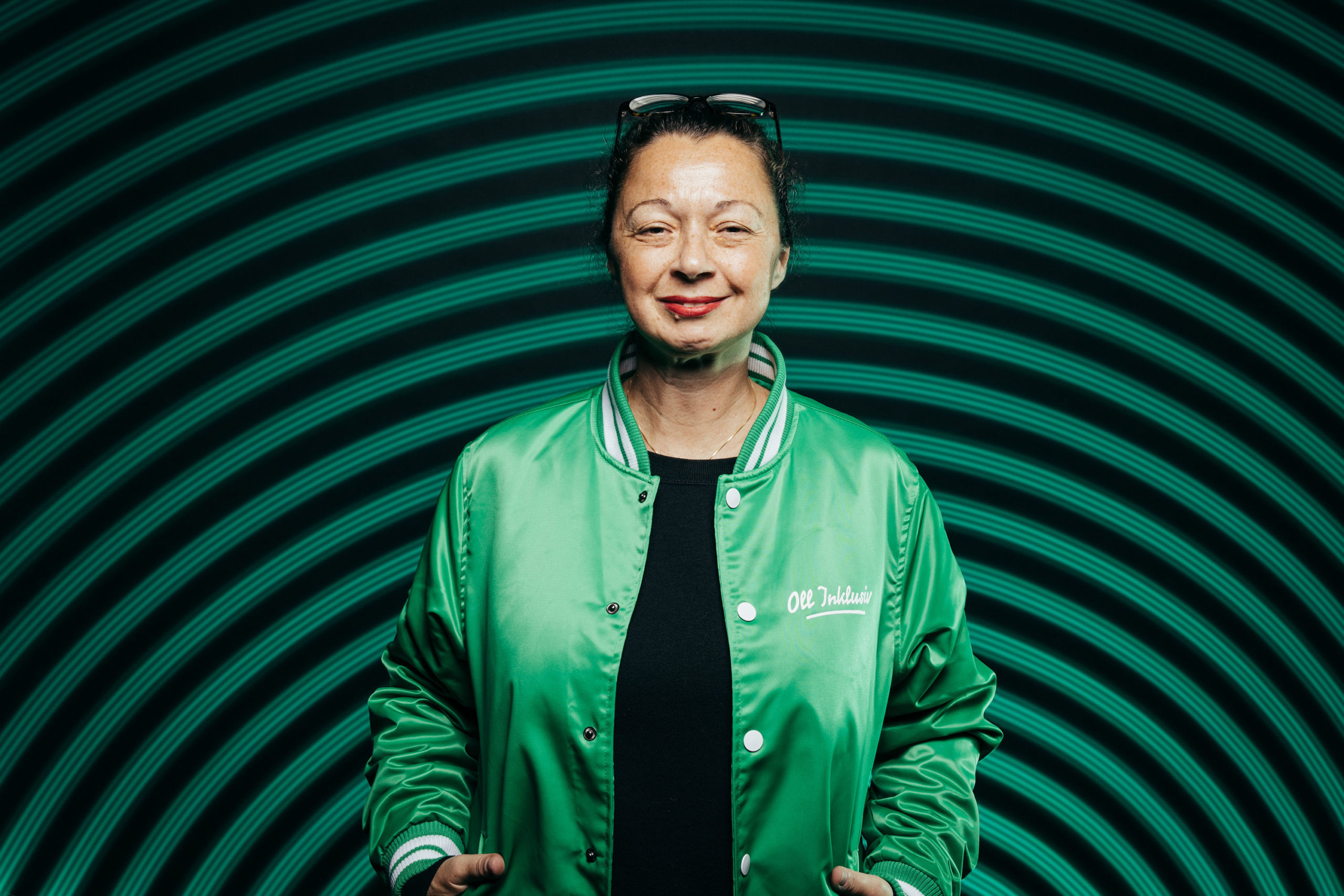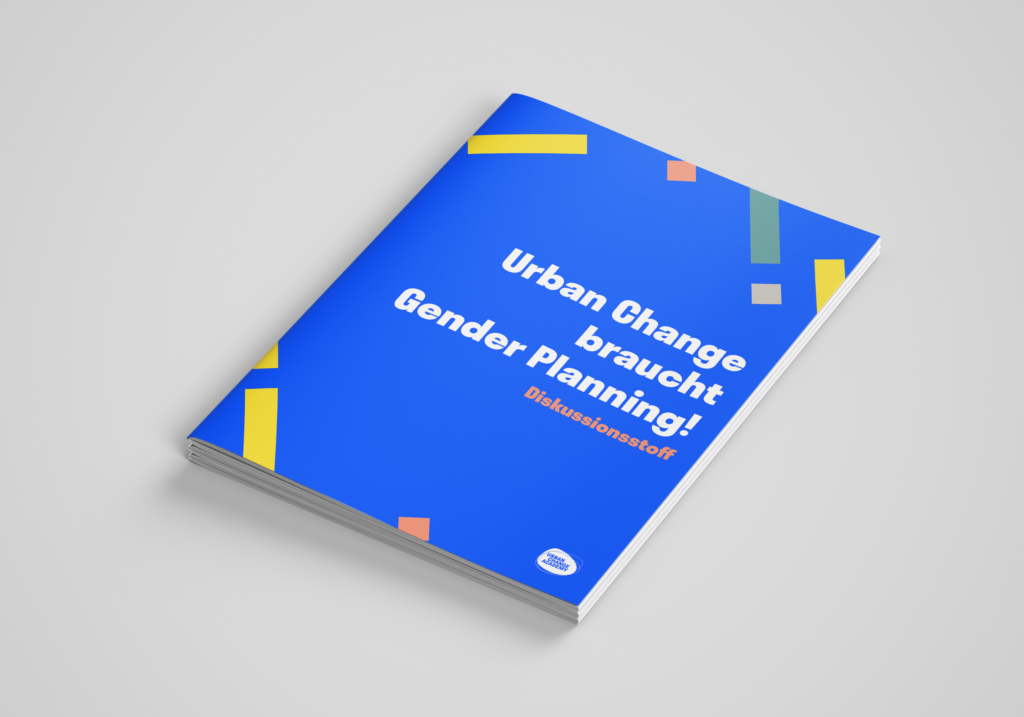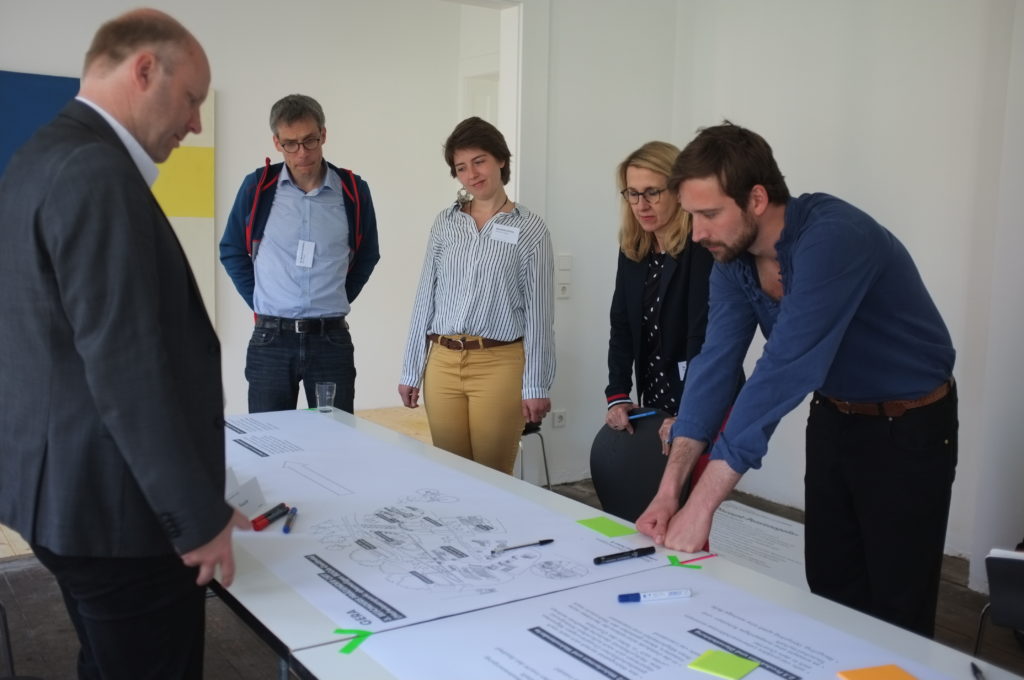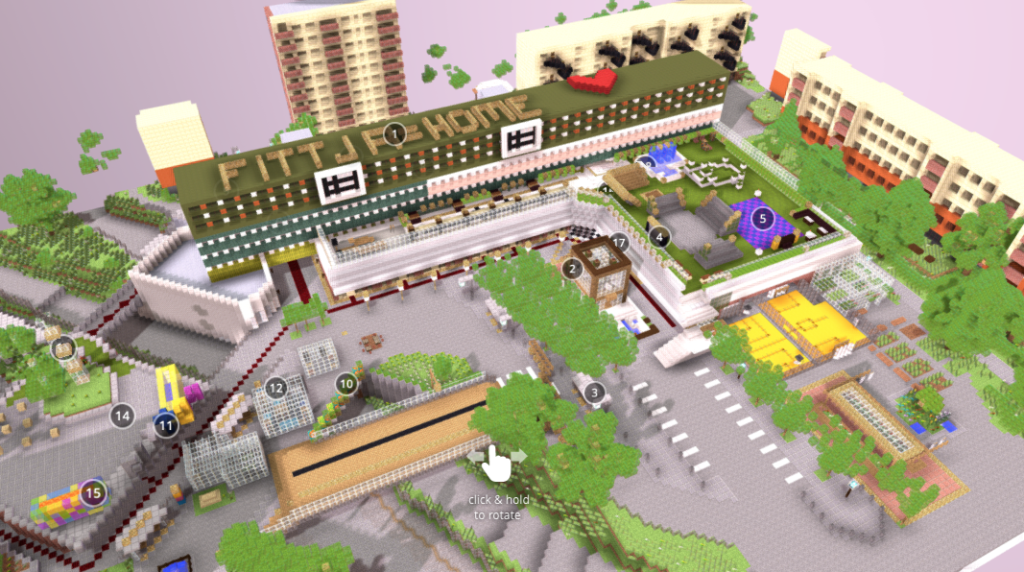The interview with Mitra Kassai took place on 04.12.2020 – barely two weeks before Germany’s second lockdown.
How have you experienced the Covid pandemic personally?
Mitra Kassai: I have experienced the pandemic as very work-intensive because I’m out and about a lot in seniors’ facilities. In 2019, I was awarded the Annemarie Dose Prize by the City of Hamburg for my social and innovative work with “Oll Inklusiv”. From the prize money, I did further training to become a senior citizen’s assistant. This means that I can go directly to the senior citizens and “senioritas”, as I call them at Oll Inklusiv. My job is to provide good humour and simply be there in both individual and group care – whether that means making phone calls, helpingwith shopping or anything else they might need.
You go on many excursions with the seniors and senioritas. What has changed for you in terms of your contact with people?
What I have missed a lot in the phase between the first and the second lockdown falls under the heading of “personal” or the hug. You notice that you have simply relearned physical greeting modalities. Whether it’s the “foot tap”, the “elbow pat” or just waving and saying hello. This physical distance that we have to maintain simply does something to your mind.
And spatially, I made sure that the Oll Inklusiv activities took place outside. We were very lucky because we had a beautiful summer. For example, I offered outdoor graffiti workshops or street art tours for the seniors and senioritas. In the future, we will introduce rickshaw rides – we call the format R’OLL on – and implement this in cooperation with the Hamburger Fahrradgarderobe and the association Radeln ohne Alter.
You can’t always get frustrated and say, “Oh no, I can’t, I won’t”, you have to think think creatively and innovatively and adapt.
I was also invited in other cities with Oll Inklusiv, like Munich for example. There was the project “Art in the Square”, it was a really great event. Various artists were asked to perform – DJs played, there were dancers, capoeira and photography courses. Everything took place outside on the Theresienwiese. I was a guest there with Oll Inklusiv and I did music bingo. I simply took our “half-board” format outdoors and replaced things that aren’t possible now with things that can be implemented. What I’m trying to say is that you can’t always be so frustrated and say, “Oh no, it won’t work, I won’t do it”, you also have to think creatively and innovatively and adapt.
What was the most surprising realisation for you in the past few months around the pandemic?
That uncertainty can take such a big place in my life so quickly. I am a very courageous person. But I realise that a lot of inse- curity has come from this pandemic. It starts with wearing a mask and ends with vaccination, and there’s a lot in between: whether it’s closing restaurants, keeping your distance, hygiene management, all these things. Sometimes something can happen and then the clubs can’t open, yet again. All this leads to uncertainty because you don’t know what will happen next. And this uncertainty does something to you. I don’t want to lose my courage because of it. My courage to change things means I continue to make society a better place.
What do you think are the consequences of the pandemic for city life and culture?
The purpose of catering offers is currently, I go out and get food because I’m hungry. But actually, going out to eat is a social interaction, whether I organise a business lunch or a dinner, or go out for dinner with friends, whether I have a romantic dinner or a blind date or whether I go to a club because I think the people there are cool. This communal coming together in society, that’s what’s missing. And restaurants and bars are the platform for that.
What I also don’t understand is why street food markets are not allowed to boom. At the end of the day, they offer exactly what you want and you can eat and keep your distance.
In my opinion, they deserve much more promotion and support from the city. Parking spaces could have been blocked and used for street food markets, so that they could stand in front of office complexes, for example. You shouldn’t put so many obstacles in people’s way. They could also have been placed in marketplaces – where there are weekly markets. Why not just allow food trucks to sell food there in the “grey zone”?
So, more flexibility in the use of space?
Yes, or more flexibility in the approval process. The “grey zones” should have been turned into “green zones.” An example: My husband and I treated ourselves to a hobby two
years ago. We bought an old 70s van and had the outside beautifully decorated by Stuka, a street artist. And in this step van there are over a hundred pairs of roller skates. We are a mobile roller skate rental company and have pushed the whole roller skate and skate scene up a bit. It’s totally booming at the moment.
And we always wanted to be here in Hamburg’s Planten un Blomen park. Just open the doors there and then start renting roller skates. And the city didn’t react at all. I wrote to the most senior people everywhere. It dragged on for five years. We simply communicated into the void because no one felt responsible.
When the new flooring was approved this year, the lady in charge at Planten un Blomen contacted me directly. And then she didn’t contact me by e-mail, but immediately via WhatsApp and we had the approval within 24 hours. Then I think to myself: “Yes, okay, sometimes it works out.” Sometimes you just have to want it. We are very grateful for that.
What would have to be done to make it easier for such ideas for temporary uses to be brought to the city’s attention and to have a chance of being implemented?
Let’s compare it to the free economy – if I have a problem, I write to the company and get a so-called ticket. And this ticket has to be processed within so and so many hours – so that I remain a loyal customer. I have now submitted a funding application to the city of Hamburg. I first had to look for the funding application. Then it was unclear where to send it. Then I had to print out the application because I had to sign it. Then I wanted to take it to the city hall to hand it in personally. I was turned away at the reception desk. I was told to post the letter because of Covid, which means I could have sent it by post. Then I didn’t hear anything for three weeks, didn’t know if anything had been received at all – so this ticket opening that you know from the economy didn’t happen at all. Then I get an e-mail saying that I have to add this and that. In the meantime, however, I get a call from another person at city hall: “I would ask you to write me an email and withdraw from the application, because we have no more funds. If you don’t write that you are voluntarily withdrawing the application, then we have to go through a lot of bureaucracy to reject it.” So: she calls me to tell me that they don’t want any work, but I don’t get any support. That’s when I thought to myself: “Well I never!” If something like that happened at a company, I would be gone in three seconds. So, it’s not just the bureaucratic hurdles and complicated procedures that are a problem. The processes are also incredibly untransparent and incomprehensible.
What else would you like to see?
That you are allowed to give an assessment afterwards: Were you satisfied with our processing, yes, no, why not, or something similar. These customer service evaluations that we’re all familiar with simply don’t exist at the city.
Let’s talk about nightlife. What do you expect for the future?
I think it’s crass that nightlife is completely at a standstill. The club industry and the catering sector were the first to come up with functioning hygiene concepts. This additional training costs upwards of six hundred euros and many have been trained. All the clubs have joined forces through club foundations or other institutions and have looked at how to create Covid-compliant offers: whether it’s sitting at a distance or outside – and yet nothing is allowed to take place. I find that very frustrating. It’s ruining a whole industry.
And what I find unfortunate is that society always says, “You just want to have fun” when it comes to music, art, culture, and parties. We shouldn’t forget how important all of this is for the social thinking in a city, even beyond the region. We change the world through music, art, and culture. We also want to convey messages. And music is not just an emotion that lives in the nightlife, but music provides food for thought. The city needs music, art and culture if it’s to change. Cities are not shaped by their musicians and artists for nothing. You can tell if it’s Ham- burg, if it’s Berlin, if it’s Kassel. Artists, musicians, creative people: they shape cities through their creative output.
I hope that it will continue. Perhaps we will have to find another way of celebrating, another way of experiencing culture. We have to keep at it and think of new things. And I’m pretty sure that nightlife will come back because that’s what we all need and want. Owls are most creative at night.
A city is created through movement. Whether it is tearing down houses and building them up, whether it’s walking from A to B or taking the underground from A to B, a city lives on movement.
Is there anything new on the horizon already? What are you observing?
I think we are all more health conscious; we have all become more active. E-bikes are, I think, more expensive than ever before. It’s unbelievable. Roller skates are sold out, skateboarding is totally in again, people go jogging a lot and generally move around outside. A city is created through movement. Whether it’s tearing down houses and building them up, whether it’s walking from A to B or taking the underground from A to B, a city lives on movement, and people move a lot.
And that’s why cityscapes will reshape themselves. For example, more skate parks could be built, or basketball courts redesigned. If you look at the parks in this city, they could really be cleaned up. Some of the park benches are completely rotten. There are playgrounds that look as if they were built in 1912. You could completely rethink the outdoor design: Why are there no decent barbecue areas? You could rent out super barbecue stations in parks. Similar to festivals where, when you camp, you have to pay a deposit and you only get it back if you leave your campsite properly. You could also rent out chairs in the park, like in England. Why can’t you rent out deckchairs like that and those who hire them make sure that the parks are kept clean?
What skills have helped you during the Covid situation? Is there a skill that you have learned recently?
Above all, I have learned to be patient. I hate patience. Patience and I are not friends, never have been. And we still struggle a bit. But I once bought a kilo of patience, and I’m still using it. And what you absolutely have to be at this time is flexible. But I’ve always been flexible. I’ve noticed that many people have to learn flexibility first. That is very, very important. Moving around in a city also means bringing a certain flexibility with you – that’s how something can come about.
What should we address with the Urban Change Academy? What would you wish for yourself, for Hamburg, for the whole world?
What I would like to see in my field of work, of course, is young and old meeting at each other’s levels and that cities are made more age-friendly. That means we not only have to show consideration for older people, but also include them better in city life. Just as we do at Oll Inklusiv, in a very modern way. A senior doesn’t necessarily always need help; a senior is simply a person who is perhaps slower, or who needs space because they have a walker. That’s what I would wish for. The aim of the project is to help shape a more age-friendly cityscape. This includes, for example, installing park benches with a higher seat so that older people can stand up more easily. Many things in everyday life can be thought through further so that they are more friendly to seniors. In this way, we can create an inclusive cityscape at our level.
Thank you very much.
Photo: © Jonas Krantz




